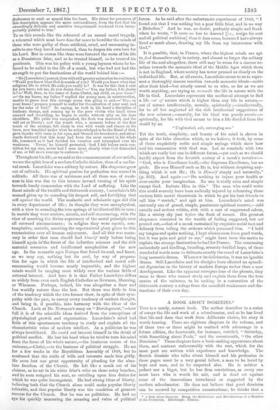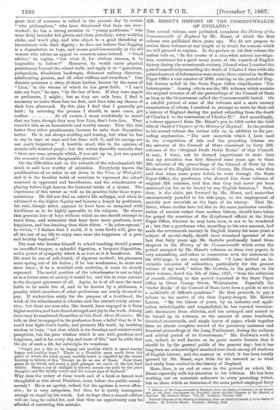A BOOK ABOUT DOIIINIES.* Tins is a manly, earnest book.
The author describes in a series of essays the life and work of a schoolmaster, and as he has lived that life and done that work from deliberate choice, his story is worth bearing. There are eighteen chapters in the volume, and of these two or three might be omitted with advantage in a future edition, the fourteenth, for instance, entitled, "Saturday, with Something about Fools," and the seventeenth, "On other Dominica" These chapters have a book-making appearance about them, and contrast unfavourably with the rest, which for the most part are written with experience and knowledge. The Scotch dominie who talks about himself and his profession in these pages must be a very genial fellow, a man to be loved by boys and men, and to be respected also. He is neither a pedant nor a bigot, but he has firm convictions, as every one must have who is worth his salt, and is dead set against some of the innovations introduced or suggested by the modern schoolmaster. He does not believe that good dominiea can be secured by competitive examinations; he thinks that a
* A Book About Dominies. Being the Reflections and Recollections of a Member of the Profession. Edinburgh : Nimmo.
great deal of nonsense is talked in the present day by certain "wise philosophers," who have discovered that boys are over- worked ; he has a strong aversion to "young gentlemen" who wear dirty lavender kid gloves and sham jewellery, carry walking sticks, and won't play, and who object to a good thrashing as inconsistent with their dignity ; he does not believe that flogging is a degradation to boys, and sneers good-humouredly at the old women who advise an appeal to common sense instead. "Good advice," he replies, "but what if, for obvious reasons, it be impossible to follow ?" Moreover, he would carry physical punishment beyond the school walls, and apply it to "garrotters, pickpockets, fraudulent bankrupts, dishonest railway directors, adulterating grocers, and all other ruffians and swindlers." Our dominie possesses a strap of stout leather, known by the name of "Lion," in the virtues of which be has great faith. "I can't rule my boys," he says, "by the law of love. If they were angels or professors, I might ; but as they are only boys, I find it necessary to make them fear me first, and then take my chance of their love afterward. By this plan I find that I generally get both ; by reversing the process I should, in most cases, get neither. At all events, I mean confidently to assert that my boys, though they may fear Lion, don't hate him. They consider him as an honourable and worthy enemy. They like him better than other punishments, because he suits their disposition better. He is not always scolding and teasing, but what he has to say he says at once and has done with it, and his sayings are not easily forgotten." A horrible creed, this in the opinion of certain soft-hearted people, but the writer shrewdly remarks that "there are some precepts which, if you act up to, you are spared the necessity of much disagreeable practice."
On the difficulties and on the rewards of the schoolmaster's life
much is said here worthy of attention. Everybody knows the qualifications of an usher as set down in the Vicar of Wakefield, and it is the familiar habit of novelists to represent the school assistant as oppressed and browbeaten, and the schoolmaster as playing before high heaven the fantastic tricks of a tyrant. The experience of this writer as well as his practice belie these repre- sentations. He did not find an usher's life unhappy, and when he advanced to the higher dignity and became a despot by profession, his rule, though strict, appears to have been so tempered with
kindliness as to be highly agreeable to his subjects. He shows that genuine love of boys without which no one should attempt to teach them, and maintains that boys have more goodness, more happiness, and less humbug than their elders. "In sober earnest," he writes, "I declare that I could, if it were God's will, give up all the rest of my life to enjoy once more the happiness of a pure and healthy boyhood."
The man who devotes himself to school teaching should possess an unruffled temper, a splendid digestion, a buoyant disposition, and a power of sympathy which is as rare as it is beneficent. His life must be one of self-denial, of rigorous method ; his pleasures
must spring out of his duties ; if he has weaknesses, he must not show them ; if he is troubled with ambition, it must be sternly repressed. The social position of the schoolmaster is not as high as in a better state of society it would be; and this to some natures is the sharpest grievance of all. Again, he is of all men the most liable to be made fun of, and to be known by a nickname, a penalty which members of other professions are rarely doomed to -pay. If undertaken solely for the purpose of a livelihood, the work of the schoolmaster is irksome and the reward rarely attrac- tive; but there are men who, like Arnold, have engaged in it from higher motives, and have found strength and joy in the work. Among these may be numbered the author of this Book About Dominies. He
tells us that he engaged in the profession from a belief that in it he -could best fight God's battle, and promote His truth, by teaching
wisdom to boys, "not that which is for Sundays and controversial -pamphlets, but the pure wisdom which is one with goodness and happiness, and is for every day and hour of life," and he adds that the joy of such a life far outweighs its vexations.
"Ought not a life to be happy and healthy which is spent among happy and healthy boys ? There is a Paradise upon earth from the gates of which the hard, proud, worldly heart is repelled by the words burning in letters of fire, 'Except ye be as one of these.' Near these gates do we dwell, and many a glad glimpse we catch of the fair land within. Many a ray of sunlight is thrown across our path by the pure thoughts and the kindly words and the honest joys of boyhood."
Why does the writer of these words and of a book so honest and thoughtful as this about Dornini, come before the public anony-
mously? He is an egotist, indeed, but his egotism is never offen- sive ; he is very outspoken, but then he' is surely, courageous
enough to stand by his words. Let us hope that a second edition will are long be called for, and that thus an opportunity may be afforded of correcting this mistake.



































 Previous page
Previous page